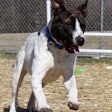Failure to respond to commercial limited antigen diets can occur in dogs kept on a dietary trial for the diagnosis of adverse food reaction. The aim of this study was to assess 12 canine dry limited antigen diets for potential contamination by ingredients of animal origin not mentioned on the label. The validity of the two methods adopted for the detection of such food antigens was also evaluated.
Each dietary product was analyzed by microscopy analysis with the aim of identifying bone fragments of different zoological classes (mammalian, avian and fish) and by polymerase chain reaction (PCR) for the identification of DNA of animal origin. Discrepancies between the results obtained by PCR and/or microscopy analysis and the ingredients listed on petfood packages were found. Only the results of two petfood analyses matched the ingredients listed on the label. In the remaining ten samples, microscopy detected bone fragments from one or two unpredicted zoological classes, revealing avian fragments in six of 10 samples followed by those of fish in five of 10 and mammalian fragments in four of 10.
In two samples, microscopy analysis identified a contamination that would have otherwise passed unobserved if only PCR had been used. However, PCR confirmed the presence of all the zoological classes detected by microscopy and also identified the DNA of an additional unexpected zoological class in two samples.
Dogs might fail to respond to commercial limited antigen diets because such diets are contaminated with potential allergens. Both PCR and microscopy analysis are required to guarantee the absence of undeclared animal sources in pet foods. Before ruling out adverse food reaction, a novel protein homemade diet should be considered if the dog is unresponsive to a commercial regimen.
Source: R. Ricci et al., 2013. Identification of undeclared sources of animal origin in canine dry foods used in dietary elimination trials. JAPAN online May 2013. doi: 10.1111/jpn.12045
















